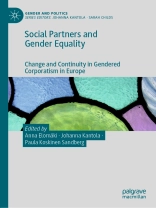This book breaks new ground in gender and politics research by studying the multiple ways in which gender and intersectional equalities shape and are shaped by social partners representing employers and employees in Europe, as well as the relationships between those social partners. Little critical attention has been paid to these organizations, yet, as this volume illustrates, social partners are important actors in relation to gender and other inequalities at the level of both individual European countries and the European Union. The chapters in this volume explore the impact of social partners on (in)equalities in a variety of 21
st-century political contexts, taking into account phenomena such as neoliberalisation, austerity, and the COVID-19 crisis. This volume adds a crucial dimension to studies on gender inequalities in the labour market, contributing to research on issues such as domestic work, the gender pay gap, and the persistent undervaluationof women’s labour and feminized reproductive labour, in particular care work. It also represents a significant contribution to the literature on gender equality policy. The book’s focus on social partners provides important insights that help to explain the persistence of gender inequalities and the difficulties of adopting and implementing policies to combat them. This volume should appeal to students and researchers of gender studies, politics, European politics, employment relations, and international relations, as well as to policymakers engaged in addressing gender inequalities in the labour market.
Tabella dei contenuti
Chapter 1. Introduction (İmren Borsuk Eroğlu, Pınar Dinç, Pınar Sayan, Sinem Kavak).- Chapter 2. Civil Society and Latent Mobilization under Authoritarian Neoliberal Governance (Bilge Yabanci).- Chapter 3. Online and Offline Spaces Intertwined: Post-Occupy Intersectional Visual Activism in Turkey (Özge Özdüzen).- Chapter 4. Persistence in Resistance: Purge of Academics for Peace under Authoritarian Neoliberal Turkey (Zeynep Özen Barkot and Lülüfer Körükmez).- Chapter 5. Women’s Work and Life Strategies in a Gendered Agribusiness in Western Anatolia, Turkey: Achievements and Limitations from a Feminist Perspective (Zeynep Ceren Eren Benlisoy).- Chapter 6. The Need to Look Beyond the Right to Property: An Assessment of Constitutional Court of Turkey Judgements on Urgent Expropriations for Hydropower Plants (Kutay Kutlu).- Chapter 7. Displacing Resistance in Kurdish regions: The Symbiosis of Neoliberal Urban Transformation and Authoritarian State (Diren Taş).- Chapter 8. Earthquake Risk-Driven Urban Transformation in Istanbul: A Relational Work Analysis of Changing Economic and Community Relations (Ladin Bayurgil).- Chapter 9. Education for the Marginalized as Resistance under Authoritarian Neoliberalism: The Case of People’s Houses Summer School (Ezgi Murat).- Chapter 10. Resistance or Survival? Rethinking Challenges to the Authoritarian Neoliberal Order in Turkey (İmren Borsuk Eroğlu, Pınar Dinç, Pınar Sayan, Sinem Kavak).
Circa l’autore
Anna Elomäki is Senior Researcher at Tampere University, Finland.
Johanna Kantola is Professor of Gender Studies at Tampere University, Finland.
Paula Koskinen Sandberg is Postdoctoral Researcher at Tampere University, Finland.












